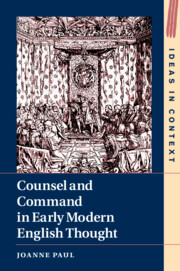Book contents
- Counsel and Command in Early Modern English Thought
- Ideas in Context
- Counsel and Command in Early Modern English Thought
- Copyright page
- Contents
- Acknowledgements
- Introduction
- Part I
- Part II
- Part III
- Chapter 6 Reason of State and the Counsellor
- Chapter 7 Counsel, Command and the Stuarts
- Bibliography
- Index
- Ideas in Context
Chapter 6 - Reason of State and the Counsellor
from Part III
Published online by Cambridge University Press: 18 February 2020
- Counsel and Command in Early Modern English Thought
- Ideas in Context
- Counsel and Command in Early Modern English Thought
- Copyright page
- Contents
- Acknowledgements
- Introduction
- Part I
- Part II
- Part III
- Chapter 6 Reason of State and the Counsellor
- Chapter 7 Counsel, Command and the Stuarts
- Bibliography
- Index
- Ideas in Context
Summary
Reason of state discourses see a renewed preoccupation with the divide between public and private. Even as there is an increased understanding of the need to keep state secrets, there are likewise increasing attempts to peer into hearts and minds of rulers. At the centre of this tension is the counsellor, whose position between public and private remains in contention. It is the emerging language of ‘interests’ which shows this tension most clearly. The counsellor is to advise according to the interest of the state, and not his own private interest. The more public a counsellor can be, the more likely he is to give advice in line with this state interest. Three problems emerge from this model, however. First, how can the counsellor be both secretive and public? Second, how can a private individual abandon his personal interests? And, third, a recurring issue, what if the counsellor knows the state’s interests better than the monarch: should his counsel then become command? These are the issues which come to the fore in the mid-seventeenth century, born of tensions apparent in the reason of state tradition.
- Type
- Chapter
- Information
- Counsel and Command in Early Modern English Thought , pp. 147 - 172Publisher: Cambridge University PressPrint publication year: 2020

